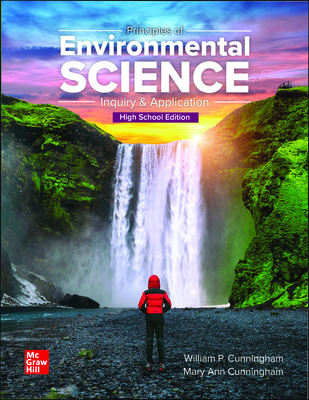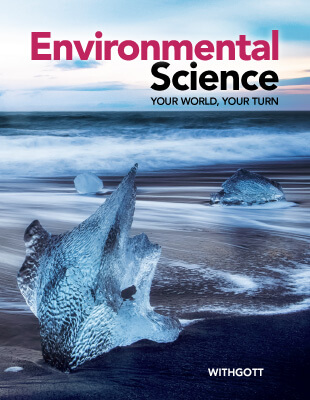3 Best Environmental Science Curriculum Options for High School
After serving as a Texas FFA state officer in 2018, Josh Witherspoon joined the iCEV team as a part-time employee for 3 years before taking on the role of content development specialist in 2022. Witherspoon holds a bachelor's degree in agricultural communications from Texas Tech University, in which his experience and proficiency in writing, marketing and CTE allow him to effectively communicate the successes of CTE educators and students and the value iCEV has to offer.
Much like the natural ecosystems that make up the world around us, the success of your classroom and students depends on the structure and support provided for them to grow.
If you teach high school environmental science, you understand the importance of finding the best curriculum for your students. If your current curriculum is outdated or isn’t comprehensive, you might not be meeting standards, or worse, students could be unprepared for future career opportunities.
With the right curriculum choice, you’re exposing students to valuable knowledge and skills as well as the opportunity to become the next generation of environmental leaders and innovators.
So, what environmental science curriculum is out there?
How are they structured, and what’s the cost?
As a passionate provider of environmental science resources, our team at iCEV aims to ensure you have all the information you need to decide which curriculum is best for you. Don’t worry; we did the heavy lifting for you!
In this article, you’ll discover 3 of the best high school environmental science curriculum options:
-
Principles of Environmental Science, 2023 Textbook from McGraw Hill
-
Environmental Science: Your World, Your Turn Resources from Savvas Learning
-
Environmental Science Issues (ESI) Course from CASE
After reading, you’ll better understand what each curriculum provider offers to decide what works best for your students.
Principles of Environmental Science from McGraw Hill
Author: William P. Cunningham and Mary Ann Cunningham
Copyright: McGraw Hill 2023
The Principles of Environmental Science textbook is a comprehensive, introductory resource in which students explore the diverse world of environmental science through exposure to real-world research, hands-on activities, and engineering practices.
The textbook is split into four units with chapters including:
- Unit 1: Studying the Environment
- Nature of Science
- Understanding Our Environment
- Unit 2: Ecology and the Natural World
- Environmental Systems: Matter, Energy, and Life
- Evolution, Species Interactions, and Biological Communities
- Population Dynamics
- Biomes and Biodiversity
- Unit 3: Resources from Air, Water, and Land
- Climate
- Air Pollution
- Water: Resources and Pollution
- Land Use
- Food and Agriculture
- Environmental Geology and Earth Resources
- Energy
- Unit 4: Sustainability and Environmental Policy
- Environmental Health and Toxicology
- Solid and Hazardous Waste
- Economics and Urbanization
- Environmental Policy and Sustainability
Within these chapters, students engage with resources, including unit projects, authentic case studies, models, and more. In addition, educators can opt to purchase the high school teacher manual, including instructional, pacing, and differentiation strategies.
Who Is This Resource Intended For?
As a digital textbook, Principles of Environmental Science is enriched with multimedia content with adaptive, personalized learning features to ensure students of all learning styles and capabilities can access and engage with the curriculum.
McGraw Hill’s Principles of Environmental Science textbook is a good fit for environmental science teachers looking for a comprehensive, introductory curriculum to teach the fundamental knowledge and skills necessary to explore environmental science.
How Much Does This Resource Cost?
McGraw Hill offers a wide variety of curriculum packaging options, including multi- and single-year subscriptions for teachers and students, as well as bundle pricing. Bundle options include the textbook, lab/teacher manual, and subscription at one flat rate depending on your subscription length.
A one-year teacher subscription for McGraw Hill’s Principles of Environmental Science textbook costs $212.20, while a one-year student subscription costs $82.24. Additional resources accompanying the textbook include the Student Lab Manual at $44.76 and the Teacher Manual at $57.64.
Environmental Science: Your World, Your Turn from Savvas Learning
Author: Jay Withgott
Copyright: Pearson 2021
Environmental Science: Your World, Your Turn combines high-interest, real-world content with digital support and various hands-on activities to help ensure student success in environmental science.
Topics covered in the textbook include:
- An Introduction to Environmental Science
- Economics and Environmental Policy
- Earth’s Environmental Systems
- Population Ecology
- Evolution and Community Ecology
- Biomes and Aquatic Ecosystems
- Biodiversity and Conservation
- Human Population
- Environmental Health
- Urbanization
- Forestry and Resources Management
- Soil and Agriculture
- Mineral Resources and Mining
- Water Resources
- The Atmosphere
- Global Climate Change
- Nonrenewable Energy
- Renewable Energy Alternatives
- Waste Management
The textbook uses case studies, lab activities, assessments, and other resources to expose students to environmental science knowledge and skills while highlighting critical topics within each unit.
Who Is This Resource Intended For?
Savvas Learning’s Environmental Science: Your World, Your Turn digital textbook and curriculum resources are an excellent fit for teachers looking for a year-long, comprehensive curriculum, including pre-made lesson plans, hands-on activities, LMS integrations, and customizable assessment tools.
If you’re an educator looking for a supplemental resource to incorporate into your existing curriculum, this book may not be the best fit for you. The lessons within this curriculum build upon one another, making it difficult to pull individual pieces apart as students may not get the full scope of what you’re teaching.
How Much Does This Resource Cost?
Savvas Learning offers a wide range of curriculum packaging options, including single- and multi-year subscriptions for teachers and students.
For example, a one-year teacher edition costs $212.50, while a one-year student edition costs $111.00. Additional resources accompanying the textbook include the Student Study Workbook at $16.00, which features skill-builder activities and case studies.
Environmental Science Issues (ESI) Course from CASE
 Curriculum for Agricultural Science Education (CASE) is a resource provider focusing on resources for teaching agriculture. Their mission is to offer quality materials and training for high school agriculture teachers, so they can better prepare the next generation of professionals.
Curriculum for Agricultural Science Education (CASE) is a resource provider focusing on resources for teaching agriculture. Their mission is to offer quality materials and training for high school agriculture teachers, so they can better prepare the next generation of professionals.
One of the courses CASE offers is called Environmental Science Issues, a supplemental environmental science curriculum covering six areas of study:
- Issue Analysis
- Biodiversity
- Unit 3 Energy, Technology, and Society
- Feeding the World
- Pollution
- ESI Research
ESI is a specialization-level course that enables students to research, analyze, and propose sustainable solutions to environmental issues. Students complete hands-on activities and projects and confront problems that simulate actual concepts and situations in the environmental science field.
Who Is This Resource Intended For?
If you’re an educator looking for a supplemental resource to implement alongside your current curriculum, the ESI course could be a good fit for your classroom. The course provides a focused approach to solving environmental issues, making it a great addition to a more comprehensive curriculum.
On the other hand, the course lacks the in-depth exploration of environmental science topics to be considered a full curriculum. For an educator who doesn’t implement any other CASE curriculum in their program, the cost might not be worth it.
How Much Does This Resource Cost?
Any teacher looking to implement CASE curriculum in their classroom is required to attend a CASE Institute training to learn how to use the curriculum. The price of CASE curriculum varies depending on the kind of training event you attend. One- to two-day training events will cost districts anywhere from $250-$1000, while 5-10 day events will cost $2500-$3500. After you complete training, you gain full access to the curriculum.
Which Environmental Science Curriculum Is Right For My Students?
Choosing the right curriculum for your students is of utmost importance. With so many options and factors to consider the search can quickly become overwhelming. While there’s a lot to consider, the right curriculum choice can take learning in your classroom to the next level.
If you’re looking for a comprehensive, year-long introductory curriculum to teach students the fundamentals of environmental science, McGraw Hill’s Principles of Environmental Science textbook could be a good fit for you.
If you’re searching for a year-long, in-depth environmental science curriculum, including pre-made lesson plans, hands-on activities, LMS integrations, and customizable assessment tools, Environmental Science: Your World, Your Turn from Savvas Learning might be the choice for you.
And if you’re looking for a supplemental curriculum to further expand and develop students’ knowledge and skills in environmental science, CASE’s Environmental Science Issues course is a great choice.
However, if none of these options seem like they would fit your class, then take a look at iCEV’s Energy & Natural Resources Technology course.
The iCEV Energy & Natural Resource Technology course examines the interrelatedness of environmental issues and agriculture by applying science and technology to measure environmental impacts through field and laboratory experiences.


